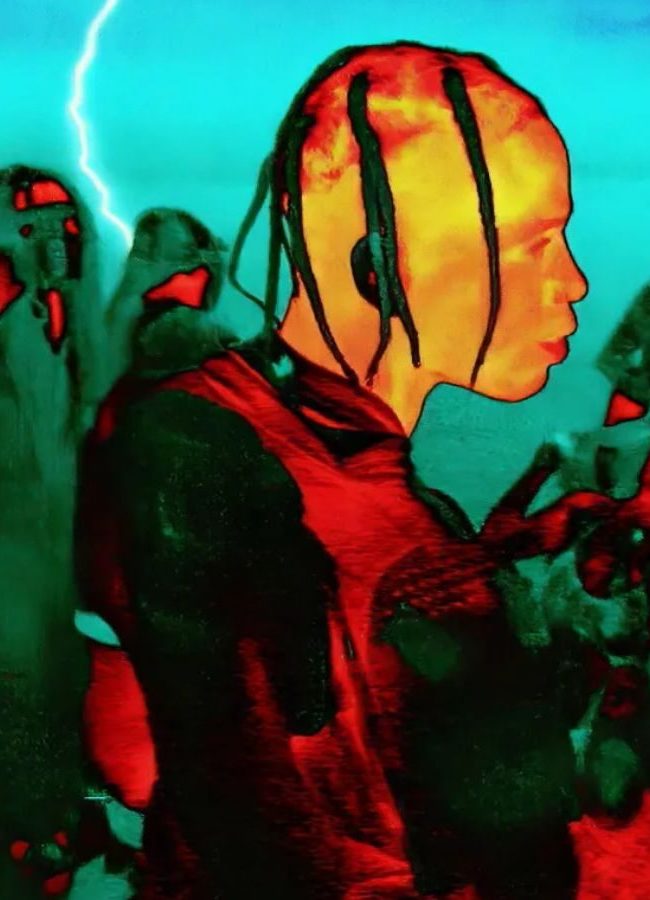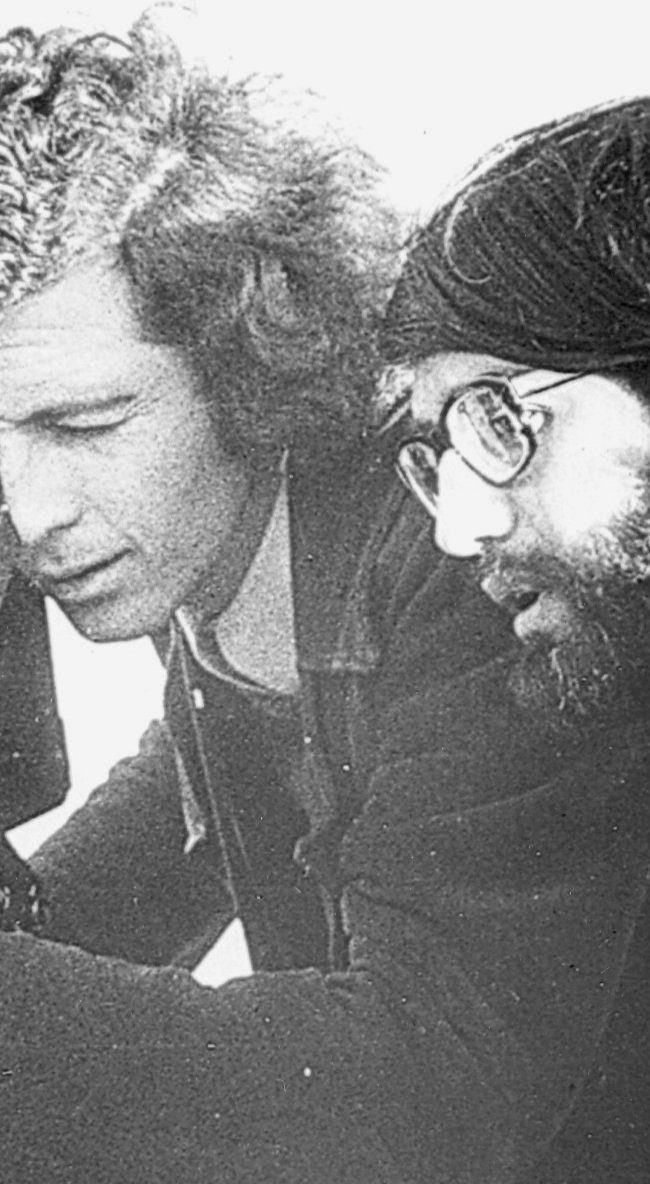Nick Toti’s “Digital Gods”- Season Two, Transmission Six (Part 3.1)
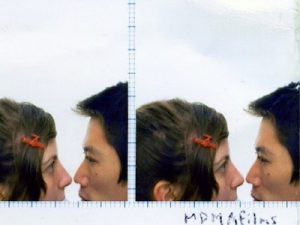 This interview is the third and final installment of my series on MDMAfilms. To be as frank as possible, I’m not terribly happy with how this interview turned out, but I think it’s worth publishing regardless. Both Megan Boyle and Tao Lin seem to have moved on from the MDMAfilms project, and their agreement to do this interview seemed motivated by politeness rather than genuine enthusiasm. This could just be my own insecurity talking, though, because I was also very aware while conducting this interview that I wasn’t doing a great job with my questions. Usually these interviews are pretty fun for me, but this one felt forced. This may be because I tend to approach filmmakers as peers, but I view Boyle and Lin more as authors who I really respect and admire more than I view them as filmmakers. Whatever the reason, I felt an above-average level of self-consciousness doing this interview and I think it’s quality suffered for it.
This interview is the third and final installment of my series on MDMAfilms. To be as frank as possible, I’m not terribly happy with how this interview turned out, but I think it’s worth publishing regardless. Both Megan Boyle and Tao Lin seem to have moved on from the MDMAfilms project, and their agreement to do this interview seemed motivated by politeness rather than genuine enthusiasm. This could just be my own insecurity talking, though, because I was also very aware while conducting this interview that I wasn’t doing a great job with my questions. Usually these interviews are pretty fun for me, but this one felt forced. This may be because I tend to approach filmmakers as peers, but I view Boyle and Lin more as authors who I really respect and admire more than I view them as filmmakers. Whatever the reason, I felt an above-average level of self-consciousness doing this interview and I think it’s quality suffered for it.
The silver-lining to this is that, towards the end of the interview, Megan Boyle has generously offered to share the previously unavailable online MDMAfilms productions with anyone who wants to see them. So, if you’d like to actually watch these movies instead of just read about them, then read on!
I’ll also take this opportunity to plug Boyle’s and Lin’s latest books, which, if you’ve read the previous two articles with any interest, would be well worth your time. Tao Lin recently published his first nonfiction book, Trip: Psychedelics, Alienation, and Change. He was nice enough to send me a copy and it was excellent. Megan Boyle’s LIVEBLOG is scheduled to be published in September. I’m about 200 pages into an advanced copy that I weaseled out of her publisher as research for this series. It’s also very, very good despite being intimidatingly long. On to the interview!
***
Hammer to Nail: MDMAfilms produced three movies in 2011. That was seven years ago. How do you feel about that project now versus then?
Tao Lin: I feel good about MDMAfilms. I’m somewhat surprised it happened, that we had that much motivation and energy and inspiration to make three movies.
Megan Boyle: I feel really glad we did MDMAfilms. I have significantly more memories of that time in my life, I think, than other times. I think that’s due to the romantic excitement I felt about Tao being compounded by a creative project. The parts of my brain that process emotion/intellect/creativity/inspiration were all highly activated. It was hard to sustain that level of excitement naturally, about anything, which at the time I viewed as a personal failure, but now I see as more of a necessary element of the creative process. 2011 seemed like the perfect time for MDMAfilms. It was before instagram, people recording themselves all the time. It seemed to lovingly prepare the world, or some small corner of it anyway, for the intensive phone-based setting human interaction has become.
HtN: At the time, your movies were branded as sort of half publicity stunt, half bemused joke. Do you think this characterization is accurate? Would you add anything to it?
TL: I never viewed it as a publicity stunt or a joke. We showed Bebe Zeva at Soho House and like 60(?) people came and it was free, we paid for everything, and during that night the movie seemed to me to be viewed as serious.
MB: That doesn’t seem accurate to me, but I was aware at the time that it was being received by people that way, which made me feel alienated in a way I think Tao had for years. In my memory there were maybe 20-30 people who seemed to “get it”– many of them writers who I already knew and felt similar to in some way. I viewed our branding as direct, earnest, and minimal. I think because we were a couple, and it was maybe unlike both of our internet personas to be happy or making jokes or even being especially productive, people viewed our excitement as coming from a place of irony or spite, like “a publicity stunt.” But I was really into it.
HtN: Part of the internal logic of these movies seems to be a reluctance to having any larger point or to resist interpretation. There’s no, like, political message or thematic takeaway other than what the viewer might project onto them. I’m curious, though, whether this is affectlessness is actually an intentional affectation. A dumber way of asking this question would be: is there a method behind this madness? Are (or, more precisely, were) your concerns really as surface-level as they seem in these movies, or is it like Bret Easton Ellis where he seems affectless in his writing but then characterizes himself as a moralist/satirist?
TL: I think our concern was with emotions and human relationships — the opposite of affectlessness. Sadness, loneliness, conversations, jokes, and discussions about previous relationships. Those things are not affectless to me. In my view, there are thematic takeaways, the viewer has to find them, in the dialogue and the structure of the movies, especially Mumblecore, which Megan edited. I think she edited tens of hours of footage into around 90 minutes. She can specify. The movies didn’t try at all to have political messages, like to tell people who to vote for or where to spend their money.
MB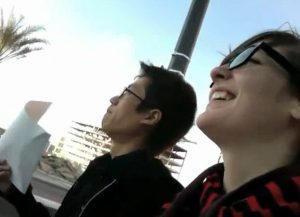 : I agree with what Tao said on this. It was the opposite of affectlessness. It wasn’t a surface-level affectation either, that wasn’t the goal. But I don’t think Tao or I are “normal” people, or something. Like, our ways of conveying meaning have always seemed different to me, in a good way, from the world. We’re not living in a world where people assume others are being honest, there’s always a “what’s the catch”-type-thing–”what’s this person trying to sell me?”
: I agree with what Tao said on this. It was the opposite of affectlessness. It wasn’t a surface-level affectation either, that wasn’t the goal. But I don’t think Tao or I are “normal” people, or something. Like, our ways of conveying meaning have always seemed different to me, in a good way, from the world. We’re not living in a world where people assume others are being honest, there’s always a “what’s the catch”-type-thing–”what’s this person trying to sell me?”
Tao and I made MDMAfilms, and I think largely each of our bodies of writing, in reaction to that, not in accordance with that. There is no moral or thematic takeaway to be made, intentionally. That’s up to the viewer. I think a lot of people expect their entertainment to “take care of them,” or something, because so many movies and books have a “moral of the story.” I’m more drawn to the nuances and every individual personality, and the complexities of our relationships. As I’ve grown, I’m also drawn to the things about the human race in general that unite us–we’re here to connect with each other, not to tell each other how or why those connections should be made. At some point I think I started saying Mumblecore was edited from 200 hours of footage. I think it might be less than that.
HtN: I like what you guys are saying in reaction to my claim of affectlessness. The idea that people sincerely express emotion in different ways (sometimes in ways that might, ironically, read as “affectless” to others) seems important, moving, very “human,” etc. It’s interesting for me to reflect on the way my reception of your movies was shaped by the ways that other people wrote about them. Since the movies were difficult to track down, I became interested in them through word of mouth and reading about them online. Was there a specific thought process behind limiting the availability of these movies?
TL: I don’t relate to most of the media’s views on the movies, because I don’t relate to most of the media’s views on anything, I think. So that seems good to me that you became interested through them via word of mouth. I don’t think we tried to limit the availability. We sold DVDs through our website for a while, and sold out of them. Vice was considering doing something with Bebe Ziva. Eventually, we put Mumblcore on YouTube where it is now.
MB: I think it’s really cool that you tracked down our movies after reading about them, and wanted to ask us questions. Thank you. There wasn’t a specific thought process behind limiting the availability, for me. I didn’t think very concretely about the actual success or promotion of them, at the time–or rather, what else I could be doing to promote that success. I think I envisioned the DVDs “promoting themselves,” kind of by magic. I was pretty naive. At the same time, I’m not sure what else I could’ve done. I think I vaguely imagined people reading interviews and articles about them, eventually leading to more screenings, then maybe future printings of the DVDs. I think we wanted the movies to eventually be widely available. In 2015 when we put Mumblecore on YouTube, we talked a little about moving everything on the MDMAfilms Vimeo account to YouTube. More people seem to use YouTube. I’m still open to doing that.
HtN: When I view these movies with an eye toward film history, they seem suddenly much bigger. They represent a sort of logical endpoint in the democratization of the cinematic means of production. Do ideas like this have any interest to you and were you thinking about anything like this when you made the movies?
TL: I didn’t think of the movies as an endpoint. I think we were excited to make full-length movies on no budget, with a MacBook, but I didn’t think of the movies in terms of film history. My inspirations were all the movies I’d seen, maybe especially movies by Andrew Bujalski.
MB: I can see that. That’s a more depressing view than I have about the movies, I think, though. It would be exciting if other people made movies about their lives, and decided to produce and distribute them on their own, without funding or a studio. When we made the movies it was before Netflix got really big. In 2015 we put Mumblecore on YouTube. To me, the internet still seems like a cool way to disseminate ideas and art. I don’t know a lot about the film industry, like I’m not sure what you mean by “democratization.” Big Hollywood movies (and even independent movies lately) seem maybe more like an oligarchy than a democracy to me. I was vaguely thinking about that in 2010-2011, feeling generally disillusioned by the traditional ways of getting your art out there. If that disillusion was there for me, it was in the background, and worked in a way to motivate/excite me about doing something with Tao that was completely self-sustained and promoted.
HtN: What I mean by “democratization” is that people can make movies without having to go through any gatekeepers. (There’s a good quote about this at the end of the documentary about the making of Apocalypse Now: “To me, the great hope is that now these little 8mm video recorders and stuff have come out, and some… just people who normally wouldn’t make movies are going to be making them. And you know, suddenly, one day some little fat girl in Ohio is going to be the new Mozart, you know, and make a beautiful film with her little father’s camera recorder. And for once, the so-called professionalism about movies will be destroyed, forever. And it will really become an art form. That’s my opinion.”) If this inspires you to add anything to your previous comments, please do so!
TL: I think to become the new Mozart, one needs a lot of luck, people around them supporting their work, and the media writing about them a certain way. Maybe one person out of thousands who makes a no-budget movie will get through the gatekeepers of the media and get coverage and distribution and other things that no-budget films don’t get normally. Personally, I’ve just thought that there have always been people making no-budget art, and only a tiny percentage of them will get attention in a way making them the new Mozart, which seems fine, because many people making no-budget art aren’t trying to become the new Mozart. So both art forms already exist to me—no budget and big budget.
MB: I see what you mean about democratization/the gatekeeping thing. I think that’s what I meant about the film industry seeming like an oligarchy, but since my experience as a filmmaker is limited, my view on that seems maybe kind of like Before the Law by Kafka. That’s a good thing for me to think about, I don’t think I’m being realistic. I felt optimistic reading that quote, but I also see Tao’s point.
I also don’t think just anyone could become the next Mozart. But I think that’s a good thing. If everyone could be Mozart, Mozart wouldn’t be Mozart. Public response and professionalism are important factors in a creation’s success, in that they help the creation reach the world, but for that to happen I think it also requires a great deal of skill/determination on the artist’s part. I don’t know that simply the possibility of bypassing gatekeepers is enough, nor do I know that bypassing the gatekeepers is completely up to chance. I think by the time Apocalypse Now was made, movies were already an art form. I look at art as a creative activity, made possible by tools/technology, that any human can do. Whether a particular creative product is successful, I think, ultimately depends on if its message speaks to the human condition in a timeless way.
Anyone who wants to create something that speaks to that has an idea of what that is, and so I think has the capability of creating that. In a sense it’s easier to promote your own work now, or bypass gatekeepers, but it’s also kind of harder, because there are a lot more people in the world today than ever, and I think a lot of us feel like expressing ourselves creatively/artistically. Which is great. I think as long as success isn’t completely measured by commercial/material value, we’ll continue to encourage and support each other’s creations.
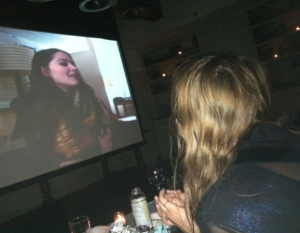
HtN: The thought process behind MDMAfilms, from what I’ve read, was essentially: “People are making successful/interesting/funny YouTube videos of themselves on drugs. We should make feature length versions of that.” Is this an accurate summary or would you add/change anything?
TL: The original inspiration was wanting to make videos of us sober, then on a certain drug, to see the difference, because we enjoyed watching videos on YouTube of people on or off Salvia divinorum and other drugs. That changed into full-length movies.
Megan: That’s an accurate summary. I think as our relationship progressed we started feeling aversion to just doing movies about us on drugs, which is why Mumblecore is about our relationship (where we were on drugs, which helped us get to know each other).
HtN: If you could choose any YouTube user to make a feature length movie, who would it be? What should the movie be?
TL: The YouTube users I’m aware of now are holistic doctors—John Bergman, Jason Fung, others—and I would like them to make movies on what they discuss: natural cures for diabetes and other health problems, the negatives of the flu and other vaccines, and the destructiveness of pharmaceutical drugs.
MB: I’ve recently been watching people’s home videos of cruises as feature length movies. I like viewing all long YouTube movies (40+ minutes) as feature length movies. I subscribe to 211 YouTube channels–mostly people who make ASMR videos, people who make videos about self-improvement and holistic health modalities, some meditation/ambient music channels, some comedians and artists, a few public figures and philosophy/critical thinking-oriented channels, NASA, and just interesting individuals whose vlogs don’t feature a lot of editing and have less than a few hundred subscribers. I’d be interested in a feature-length, high-production-cost studio documentary about Mark Baumer’s life. He was killed by an SUV while walking barefoot across America last winter, and uploaded a video for every day of his trip.
HtN: I really like the fact that all of your movies were shot on a laptop. It’s funny to periodically remember while watching that you’re awkwardly carrying around this open laptop the whole time. If the movies had been shot on a phone or tablet, it weirdly would have changed a lot (the angles of shots, the ability to easily put the camera down and keep shooting, the attention the laptop draws to itself, etc.). How did shooting on a laptop affect the experience of making these movies?
TL: Shooting on a MacBook was surprisingly natural and easy. With a phone, it is hard to film without people knowing you’re filming. By putting down a MacBook, the angle is steady and people are less aware, or not aware, of the filming.
MB: I like the aspects you mentioned and Tao mentioned, about shooting on a laptop. At the time I remember using a laptop more than I use mine now (I use a desktop and a phone, mostly). I would forget it was there, a lot. It just seemed like an organic extension of my body or something, which I think helped me to be candid, and to focus more on Tao/whatever we were doing than the fact that we were filming whatever it was.
HtN: Can you talk some about the process of editing these movies? MDMA had no cuts, but you did have to choose where the one shot would start and end. The other two movies are more heavily edited; how did you determine what to keep or cut?
TL: I think I edited Bebe Zeva and Megan edited Mumblecore. I like movies with a lot of dialogue, so I included a lot of dialogue. I modeled the ending of Bebe Zeva on Land of Silent and Darkness by Werner Herzog. Megan and I disagreed on the ending, I remember.
MB: MDMA had one cut, which was the end cut. I remember waiting for a subway after we’d finished filming it, and quickly agreeing on where to end it. Tao edited Bebe Zeva and I edited Mumblecvore. We each edited versions of the ending of Bebe Zeva and argued about it a little, one night at the University of Baltimore. I like Tao’s ending better. Mine was kind of “message-y,” like, focusing on the image of a bottle of soda rather than us getting out of the hot tub/the night reaching its natural end.
For Mumblecvore, I used the narrative of my memory of our relationship. It was really convenient because we started filming each other the first night we hung out without other people around, at my apartment in Baltimore in October 2010, and the next day I think we had the idea for MDMAfilms. By “convenient,” I mean filming each other was a constant in our relationship–from the time before it became romantic, to us getting married, and less so as we seemed to be losing interest in the relationship. The timeline of our relationship was just really clear in my memory–I don’t remember a lot of scanning over the 200 or however many hours, it was mostly really easy to find the things I wanted to include. There were maybe ten main iMovie events that I used.
I started editing it in March 2011, after the Bebe Zeva premiere, and finished in May 2011. I remember starting to hate myself, like, “the character of me,” as I was editing it. I noticed I say “yeah” and “uh” and “um” more than Tao, and tried to edit those out. But it was sometimes difficult to get the moment exactly, because I would often overlap/interrupt Tao to say something directionless. I noticed a kind of naturally-occurring motif of us being in cars, talking about where to go and sometimes having mild tension about driving styles, which I started to view as a metaphor for the relationship. It ends with a shot of me in the passenger seat after we got married, wanting to focus more on being in a good mood than my apprehension about the future, saying “I’m just trying to figure out where we are in relation to everything.”
Stay tuned for Part 2 of Nick Toti’s Digital Gods interview with Tao Lin and Megan Boyle of MDMAfilms next week!
– Nick Toti (@NickTotiis)








